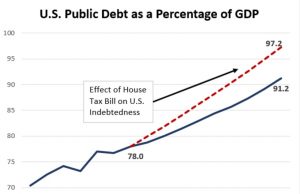For the first 191 years of the Republic there were no government shutdowns. In the spring of 1980, however, Attorney General Benjamin Civiletti issued an opinion pointing out an inconvenient fact. Failure to shut down government operations during periods in which there was no legislation to fund those operations was a clear and direct violation of the Budget and Accounting Act of 1921—a law containing criminal penalties for those who committed such a violations.
Since then, there have been 10 instances in which the government was for at least a short period shut down as the result of a funding gap. Six of those were merely overnight or weekend shutdowns while three created more serious long-term gaps in government operations.
Of those three, two involved the 1995 dispute between House Republicans and the Clinton White House over cuts to Medicare and other domestic programs which were being demanded by then Speaker Gingrich. Gingrich forced a 5-day partial shutdown beginning on November 14, 1995 followed a few weeks later by a second 22-day shutdown.
Public opposition to that shutdown was so vehement that no one attempted another shutdown for the next 17 years. In October 2013, however, House Republicans, determined to force repeal of the Affordable Care Act decided to block funding of other government activities to pressure President Obama into signing repeal legislation. The kept much of the government shut for 16 days as they gradually began to realize that their shutdown strategy was no more popular than the efforts of the predecessors 17 years before.
Funding the government and all of its various activities has always been contentious. People from different parts of the country and with different philosophical perspectives naturally have strong disagreements about where available dollars should be allocated. And regretfully, those differences frequently remain unresolved at the beginning of a new fiscal year when additional funds are necessary for departments and agencies to continue to function.
For that reason, our political system has, developed a formula for allowing the government to operate while such disputes are worked out. The formula is really quite simple. Every department and agency is allowed function at the previous year funding level and under the same terms and conditions that existed in the previous year. There are no cost of living increases and the awarding of new grants and contracts are largely held in abeyance until a long-term funding agreement is finalized.
We call that formula a “continuing resolution.” As long as everyone fully appreciates the stupidity and destructiveness of a shutdown and is willing to work within the general framework of the long standing continuing resolution formula, shutdowns don’t happen.
The shutdown that began at midnight on December 22, 2018 is clearly an instance where once again one of the essential parties to the enactment of a continuing convinced themselves that they had a better idea. By abandoning the formula and inflicting the the pain caused by a shutdown they could force the adoption of policies that could not succeed on their own.
Why is this political maneuver destined to end up in exactly the same way as the shutdowns of 1995 and 2013? Because a great many people get taken hostage who have nothing to do with the dispute in question. People planning to visit a national park; hoping to get help from the IRS on a personal tax matter; seeking information about their Social Security benefit, federal employees who simply expect to get paid for their work; people waiting for renewal of their passport or any of a thousand other things that Americans rely on their government to do. They suddenly find themselves the collateral damage of a dispute that Washington ought to be deciding on its own merits.
Not surprisingly, there is an angry response not only from people directly impacted by the shutdown as a tool for legislative leverage but by the broader public, who seem to grasp the gross unfairness of such tactics far quicker than some of the people they have elected to represent them. To date, every shutdown has backfired on its perpetrators. Americans are dismayed when their elected officials can’t resolve their differences in deliberate and professional manner. They are outraged when those they have elected try to get their way by deliberately inflicting collateral damage on people who are not parties to the dispute–and they should be.
There seems to be no rational explanation as to why the current episode of “Close the Government” will end differently than any of those that preceded it.











